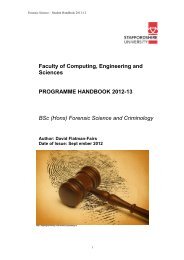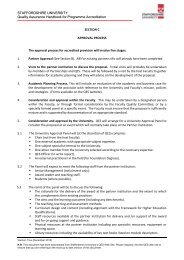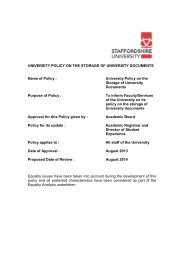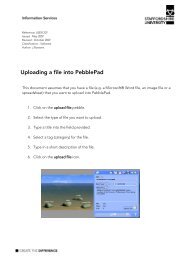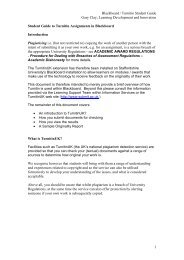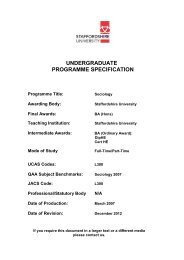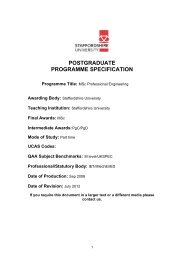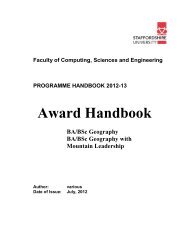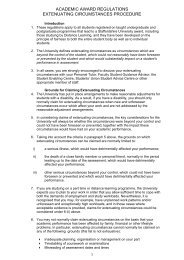Paramedic Practice - Staffordshire University
Paramedic Practice - Staffordshire University
Paramedic Practice - Staffordshire University
You also want an ePaper? Increase the reach of your titles
YUMPU automatically turns print PDFs into web optimized ePapers that Google loves.
4.7.1 Inter-Professional Learning<br />
Over the last decade several reports have advocated the need to identify and<br />
maximise opportunities for students from the various health professions to learn<br />
together in a multi-professional environment (e.g. Department of Health 2000). The<br />
benefits of this approach include:<br />
The development of mutual understanding and respect<br />
Understanding of differing theoretical perspectives and conceptual models<br />
The reduction of misunderstanding through shared terminology<br />
Inter- professional awareness and empathy (Barr et al 2000).<br />
The Award will enable you to develop a professional perspective in relation to self<br />
and others, who are effective communicators, able to contribute productively as part<br />
of a multi-disciplinary team and who are organisationally aware. To enhance this, the<br />
curriculum is designed to maximise the use of inter-professional learning<br />
opportunities between different health profession (e.g.„Introduction to<br />
Communication and Information‟ and „Healthy Individuals and Communities‟<br />
modules). In addition, at all times, you will be experiencing shared learning in<br />
clinical practice through working in teams and joint educational opportunities in<br />
practice areas. Therefore, some teaching sessions may be undertaken with students<br />
preparing for other health care professions, which afford opportunities for working<br />
together with future colleagues, drawing on their diverse backgrounds and<br />
experiences.<br />
4.7.2 Problem-Based Learning<br />
Problem-based learning (PBL) is an approach whereby learning is enhanced by<br />
attaching new pieces of information on to an existing foundation of knowledge.<br />
Students work in a group and individually with a task or challenge that resembles<br />
real-life problems acting as a stimulus for learning. PBL will initially be facilitated by a<br />
tutor and then student led, leading to a final group presentation.<br />
PBL has many advantages. For example Barrows and Tamblyn (1980), who<br />
originally developed the use of PBL in medical curricula, suggest it develops clinical<br />
reasoning, decision making, and critical thinking more efficiently than traditional<br />
methods of learning; it activates and uses prior knowledge; it promotes holistic<br />
patient care and the ability to work and communicate effectively within the care<br />
team; it integrates learning and assists in remembering; and it increases student<br />
motivation and satisfaction.<br />
PBL will feature throughout the „Foundation Skills for <strong>Paramedic</strong> <strong>Practice</strong>‟ and<br />
„<strong>Paramedic</strong> <strong>Practice</strong> and Role Development‟ modules to encourage integration of<br />
subject matter studied on different modules and application of knowledge to practice<br />
4.7.3 Self-Directed Learning<br />
The ability to organise and direct your own learning is an important skill. Skills for<br />
directing your learning are introduced early in the Award, both in welcome week and<br />
in module teaching. You will be required to develop and use these increasingly as<br />
the Award progresses. Through module teaching, learning exercises, through the<br />
18




